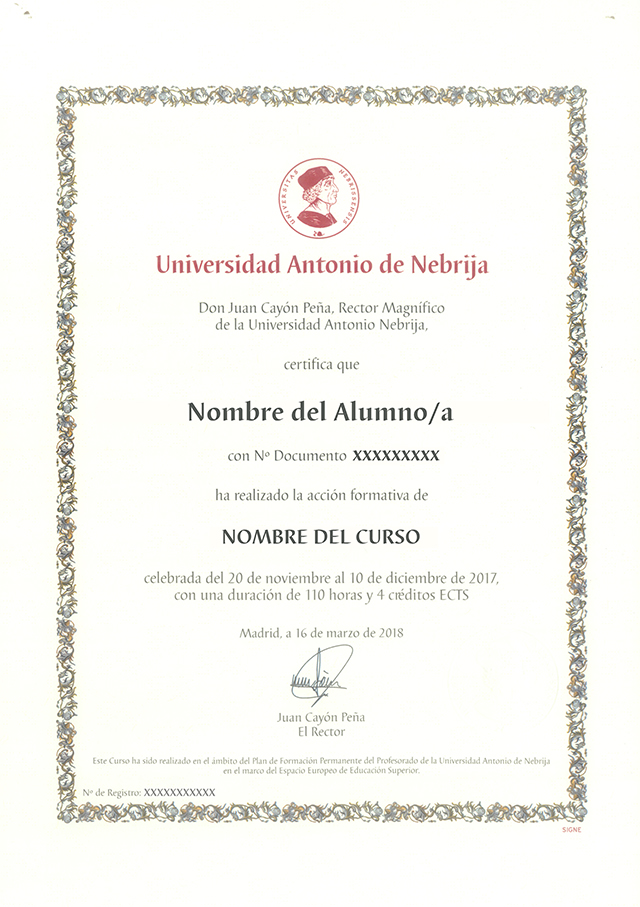English courses online master oppositions: pack 6 courses Oppositions English teaching - coexistence + learning difficulty + pedagogy + diversity + didactic programming + cooperative learning (6 university degrees + 30 ECTS)

Request information


Syllabus
Download syllabus in PDFCurriculum
Summary
This pack of English master courses allow students to carry out 6 approved courses for education oppositions. These courses are intended to increase and complete professional teaching knowledge and capacities, and to increase the score of the merits for student oppositions. These 6 approved courses count, each, with 5 ECTS credits (125 hours), telling this pack of courses with 30 ECTS (750 hours).
Goals
Professional opportunities
To prepare you
This pack of English master courses allow students to carry out 6 approved courses for education oppositions. These courses are intended to increase and complete professional teaching knowledge and capacities, and to increase the score of the merits for student oppositions. These 6 approved courses count, each, with 5 ECTS credits (125 hours), telling this pack of courses with 30 ECTS (750 hours).
Who is it addressed to?
This pack of English master courses are aimed at all professionals and students who wish to improve and increase their teaching training. These 6 courses that make up the pack, are also aimed at those opponents who wish to increase their score, since they are baremable in magisterium and education oppositions. Each of these 6 courses has 5 ECTS (125 hours), that is, the full pack gives 30 ECTS (750 hours).
Official Character
This training is not included in the scope of official regulated training (Infant Education, Primary Education, Secondary Education, Official Professional Training FP, Baccalaureate, University Degree, Official University Master and PhD). It is therefore a complementary and/or specialization training, aimed at acquiring certain skills, skills or aptitudes of a professional nature, being able to be barely as merit in workbags and/or opposition competitions, always within the complementary training section and/or continuous training being always essential to review the specific requirements of the public labor stock of the public labor stock market.

Our methodology combines technology, pedagogy and empathy for learning tailored to you.
You set the pace, decide the path and artificial intelligence accompanies you so that you learn better, with meaning and purpose.

Truly personalized learning
Your style, interests and level define the route. You are the starting point.

Constructivism in action
Explore, experiment and apply. Learning means understanding, not memorizing.

AI that accompanies you, not directs you
PHIA, our artificial intelligence assistant guides you without limiting your autonomy.

Evaluation without pressure
Continuous and adaptive feedback. Because learning is a process, not a number.
Certification


Multiple degree: - University degree of educational intervention for the improvement of coexistence and discipline with 5 ECTS university credits. - University degree in psychoeducational intervention in the face of learning difficulties for teachers with 5 ECTS university credits. - University degree in systemic pedagogy with 5 ECTS university credits - University degree in attention to diversity in educational centers with 5 ECTS university credits. - University degree in elaboration of didactic programming for oppositions with 5 ECTS university credits. - University degree in multiple intelligences and cooperative learning with 5 ECTS university credits.

EducaHub Scholarships
Make your training more accessible: finance at 0% interest and obtain personalized scholarships.
At EducaHub we believe that education should be available to everyone. For this reason, we offer a Scholarship Plan that facilitates your access to practical, current and quality training, eliminating economic barriers.
-25%
Alumni Scholarship: for former EducaHub students.
-20%
Unemployment Scholarship: if you prove that you are unemployed.
-20%
Large Family Scholarship: for families with 3 or more children.
-20%
Disability Scholarship: for people with disabilities ≥33%.
-15%
Emprende Scholarship: for self-employed workers who can prove their activity.
-15%
Recommended Scholarship: if you come recommended by a former student.
-15%
Group Scholarship: for joint registrations of 3 or more people.

An entire educational universe, on a single platform.
An intuitive environment with AI that guides you to train autonomously and with purpose.

Learn at your pace
Courses, master's degrees and official qualifications. 100% online, flexible and at your pace.

Access from anywhere
Available 24/7 on mobile, tablet or PC. You decide when and how to train.

Phia, your AI mentor
It challenges you, motivates you and personalizes your path. Learn with a guide that evolves with you.

LX One Plus: Training without limits
Unlock soft skills, languages and more. Move towards comprehensive and continuous training.



